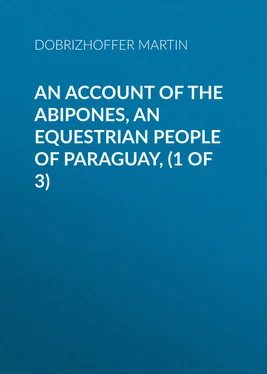Martin Dobrizhoffer - An Account of the Abipones, an Equestrian People of Paraguay, (1 of 3)
Здесь есть возможность читать онлайн «Martin Dobrizhoffer - An Account of the Abipones, an Equestrian People of Paraguay, (1 of 3)» — ознакомительный отрывок электронной книги совершенно бесплатно, а после прочтения отрывка купить полную версию. В некоторых случаях можно слушать аудио, скачать через торрент в формате fb2 и присутствует краткое содержание. Жанр: foreign_antique, foreign_prose, на английском языке. Описание произведения, (предисловие) а так же отзывы посетителей доступны на портале библиотеки ЛибКат.
- Название:An Account of the Abipones, an Equestrian People of Paraguay, (1 of 3)
- Автор:
- Жанр:
- Год:неизвестен
- ISBN:нет данных
- Рейтинг книги:3 / 5. Голосов: 1
-
Избранное:Добавить в избранное
- Отзывы:
-
Ваша оценка:
- 60
- 1
- 2
- 3
- 4
- 5
An Account of the Abipones, an Equestrian People of Paraguay, (1 of 3): краткое содержание, описание и аннотация
Предлагаем к чтению аннотацию, описание, краткое содержание или предисловие (зависит от того, что написал сам автор книги «An Account of the Abipones, an Equestrian People of Paraguay, (1 of 3)»). Если вы не нашли необходимую информацию о книге — напишите в комментариях, мы постараемся отыскать её.
An Account of the Abipones, an Equestrian People of Paraguay, (1 of 3) — читать онлайн ознакомительный отрывок
Ниже представлен текст книги, разбитый по страницам. Система сохранения места последней прочитанной страницы, позволяет с удобством читать онлайн бесплатно книгу «An Account of the Abipones, an Equestrian People of Paraguay, (1 of 3)», без необходимости каждый раз заново искать на чём Вы остановились. Поставьте закладку, и сможете в любой момент перейти на страницу, на которой закончили чтение.
Интервал:
Закладка:
Let us now return to Nicholas, whom error and malice have gifted with an imaginary sceptre. He was born in the city of Concepçion; his ancestors were Guarany Indians, and he had married, many years before, a Guarany woman in the city of Concepçion, where also he had held many and various offices. Father Ignatius Zierhaim boasts that this celebrated Nicholas, monarch of Paraguay, was publicly whipped, when a young man, by his orders, himself being vicar of the place. Nicholas was a tall man, with a good countenance, but grave and taciturn; his face was good-looking, though marked with a large scar. Think then how ridiculously fable must have been added to fable, when this Nicholas was made out a lay-brother of our order. Only five of this description were with us at that time, whereof two were physicians, the third had the charge of providing apparel, the fourth was employed in painting churches, and the fifth was a feeble old man, whose maladies exercised our patience and his own. None of them bore the christian or sur-name of Nicholas, and they were all Europeans. Persons of Indian extraction were never adopted into the number of priests or brothers. The Indians are none of the wisest, I own, but they are not such idiots as to crown a layman in preference to the priests, whose dignity and wisdom they rank so high, if the madness of choosing their own king had possessed them. Allowing the Jesuits, in a fit of insanity, to have aimed at the sovereign power, they would not have elected an uneducated layman, but some priest of distinguished virtue and prudence. An anonymous Frenchman, in a book intitled, Nouvelles Pièces intéressantes et nécessaires , says, page 18, "I will now show you the origin of Nicholas, King of Paraguay, being supposed a lay-brother. Some Spanish countrymen happened, in the course of conversation, to mention the late insurrection on the banks of the Uruguay." "Verily," says one, "if the Jesuits be wise, they will put the government of the Indians into the hands of Joseph Fernandez, a lay-brother of theirs." This Joseph was a native of Spain, formerly lieutenant of some light-armed cavalry of the king's, and a man of great military science. We never find a story lose by carrying. The vain supposition of putting the Indians under the conduct of this lay-brother was reported in such a manner that what one said should be done, another said was done, and the rest giving implicit credit to their asseverations, a prodigious tale grew out of nothing. This Joseph Fernandez, during the disturbances of the Uruguay, was master of the public school at Tucuman, and necessarily remarked by the whole of this populous town, if he intermitted his attendance for a single day. Having held the office of school-master many years, he managed an estate in the neighbourhood of the city, and so diligent was he in the exercise of his calling, that I could swear to his never having seen the land of the Guaranies of which he was reported King.
To corroborate my account I shall subjoin a few circumstances relative to this affair. From the seven towns which were garrisoned on their surrender by the Spaniards, upwards of thirty thousand Indians departed. Among all who witnessed these innocent exiles, their tender infants, and their feeble old men, not one but shed a tear of compassion. Fifteen thousand of the emigrants were received by the towns of the Parana, and lodged in hovels of straw, – they whose former homes had been of stone, well-built, and commodious. Nearly the same number were dispersed over the plains of the Uruguay, where numerous herds of cattle supplied the means of subsistence. The towns at length evacuated, were offered by the Spanish Governour to the Portugueze, but not accepted. Amongst other ways of accounting for this refusal on the part of the Portugueze, it was reported, that, after exploring the lands of the Uruguay, they found them destitute of the gold and silver they expected to find there. At this crisis of affairs died Barbara, Queen of Spain, a Portugueze by birth, and through an overweening attachment to her own country, a strenuous advocate for the exchange of lands in Paraguay. Not long after, Ferdinand the Sixth followed his consort to the tomb. Charles the Third succeeded his brother in right of inheritance. Whilst King of the Two Sicilies he had disapproved these treaties which settled the exchange of lands in America with Portugal; and on his succeeding to the throne, he utterly abrogated them, as fraught with danger to the monarchy. He restored the Guarany exiles to their towns, which now, alas! resembled Jerusalem after the return of the Jews from Babylon. They found their farms drained of cattle, their fields over-run with brambles and insects, their houses either burnt or miserably dilapidated; nay, they were sometimes terror-struck by the dens of tigers and the holes of serpents! Charles confirmed the Jesuits in their old administration of the Guarany colonies, of which the Portugueze party itself did not wish their utter deprivation. Had the King believed us the fomenters of the late war he would not have committed the Guaranies to our care and fidelity. About the same time, Zeno, Marquis de la Ensenada, was recalled from banishment to Madrid by the royal letters. This principal court minister had never admitted the exchange of lands agreed upon with the Portugueze, but had transmitted notices of it to Charles then King of Sicily. For this, if we may credit a report prevalent in Spain, the Marquis de la Ensenada was banished. That was not the happy time when you might think as you chose, and speak what you thought.
King Charles not only refused to acquiesce in the treaties ratified with the Portugueze, but immediately declared war upon that people; to the carrying on of which six thousand Guaranies strenuously applied themselves in the royal camp, under the conduct of Pedro Zevallos, who having occupied Colonia, carried his victorious arms into Brazil; but being stopped by the news of peace having been restored in Europe, testified in his letters to the King, that the success of his expeditions was greatly owing to the Guaranies. Suffer me, by way of episode, to draw a rude sketch of the immortal hero Zevallos. His father, the descendant of a noble family in Spain, was royal governour in the Canaries, and died in an insurrection, bravely fighting for the crown. The son, Pedro Zevallos, was handsome, tall, and well made, and the comeliness of his person was set off by the elegance and suavity of his manners. Courteous among his friends, and authoritative with his soldiers, he was neither ruffled with anger, nor soured with harshness. At every place and time he maintained the character of the pious Christian, the consummate general, the equitable judge, and, if need required, the dauntless soldier. During his leisure hours you might see him praying on his knees in the church for two hours together. Such was the innocence and integrity of his life, that envy, argus-eyed as she is, could never detect a stain to reprobate. So exemplary was his conduct, that the soldier and the christian never jarred, but harmonized together in one beautiful concord. The victories which have gained the Spanish hero the plaudits of his country, are rather to be attributed to his piety, than to his military skill; – to that heaven by which his undertakings were constantly favoured, and his slender resources rendered sufficient. In the keenness of his wit, the sagacity of his judgment, the courage and alertness of his mind, and the soundness of his loyalty, if one man ever excelled another, he excelled. His steadfast aim was to benefit rather than please his sovereign, and both he effected, though more than once disgraced from the royal favour by the artifices of calumny. He did nothing without much previous consideration. To crown his purposes with success, he was master of the most admirable devices; was never at a loss to remove obstacles, – to anticipate dangers, – and either elude them by artifice, or overcome them by force. He never charged the future with the present business – never let slip a good opportunity: did nothing from impulse, every thing from reason; yet though never headstrong in attempting any thing, or hasty in attacking an enemy, in battles and sieges he was fierce and determined. Neither dejected by adverse nor inflated by prosperous circumstances, he always preserved an equal mind. By kindness and good example, he bound his soldiers to a prompt obedience; and this I conclude was the cause of his doing so much with such scanty resources. He was not content to have given his orders, he would himself overlook their execution. On the eve of an expedition, he used to inspect the waggons, carefully enquiring whether they were stored with the requisite arms and provisions, and if they were properly guarded. Rarely trusting to vague reports and uncertain answers, he examined every thing, as far as he was able, in his own person. Early in the night he inspected the different stations of horse-guards, regardless of sleep, as indeed he was of every other indulgence. He used to say, that vigilance in the general and obedience in the men, were the safeguards of the army, and the parent of victory, a maxim most happily demonstrated in his own person.
Читать дальшеИнтервал:
Закладка:
Похожие книги на «An Account of the Abipones, an Equestrian People of Paraguay, (1 of 3)»
Представляем Вашему вниманию похожие книги на «An Account of the Abipones, an Equestrian People of Paraguay, (1 of 3)» списком для выбора. Мы отобрали схожую по названию и смыслу литературу в надежде предоставить читателям больше вариантов отыскать новые, интересные, ещё непрочитанные произведения.
Обсуждение, отзывы о книге «An Account of the Abipones, an Equestrian People of Paraguay, (1 of 3)» и просто собственные мнения читателей. Оставьте ваши комментарии, напишите, что Вы думаете о произведении, его смысле или главных героях. Укажите что конкретно понравилось, а что нет, и почему Вы так считаете.












